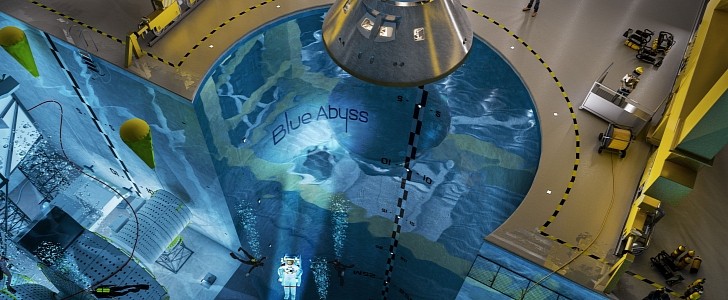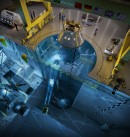One of the world’s top facilities for extreme environment research, test and training, is being built in Cornwall, UK. Planned to be the largest and deepest pool in the world, Blue Abyss will operate as the first commercial astronaut training center.
The thought of the world’s deepest indoor pool is a little scary, but that’s because it’s definitely not meant for family fun. In fact, it’s supposed to mimic some of the most extreme environments, for astronaut trainings and undersea robotics research. Founded by an ex-forces diving instructor, John Vickers, and backed-up by British astronaut Major Tim Peake, Blue Abyss wants to build a one-of-a-kind facility that will take space, marine and defense research to a whole new level.
Designed by British architect Robin Partington, the center will be built on a 10-acre site, in the Aerohub Business Park at Cornwall Airport Newquay, near Spaceport Cornwall. It will house a giant pool, with a 40m by 50m (131 x 164 feet) surface, a 52 feet (15 m) wide shaft and 164 feet (50 m) depth. The pool will be able to hold 42,000 cubic liters of water, which is the equivalent of 17 Olympic-sized swimming pools.
In order for large objects to be lowered into it, the pool features a sliding roof and 30-ton crane. Plus, factors such as temperature, lighting and salinity can be controlled, so that the pool can mimic various conditions, depending on the type of test or research that’s being conducted. Besides the unique pool, Blue Abyss will also include hypobaric and hyperbaric chambers, an astronaut training center, a human performance center, and accommodation facilities.
As its name suggests, this incredibly deep pool will create the perfect environment for a variety of groundbreaking projects, not just astronaut training. Royal Navy officials have already expressed their interest in it for developing underwater capabilities, university research teams will study remotely operated subsea robots, and even offshore energy projects will benefit from this.
The $213 million (£150 million) project is currently applying for planning permission in Cornwall and will begin operating by 2023.
Designed by British architect Robin Partington, the center will be built on a 10-acre site, in the Aerohub Business Park at Cornwall Airport Newquay, near Spaceport Cornwall. It will house a giant pool, with a 40m by 50m (131 x 164 feet) surface, a 52 feet (15 m) wide shaft and 164 feet (50 m) depth. The pool will be able to hold 42,000 cubic liters of water, which is the equivalent of 17 Olympic-sized swimming pools.
In order for large objects to be lowered into it, the pool features a sliding roof and 30-ton crane. Plus, factors such as temperature, lighting and salinity can be controlled, so that the pool can mimic various conditions, depending on the type of test or research that’s being conducted. Besides the unique pool, Blue Abyss will also include hypobaric and hyperbaric chambers, an astronaut training center, a human performance center, and accommodation facilities.
As its name suggests, this incredibly deep pool will create the perfect environment for a variety of groundbreaking projects, not just astronaut training. Royal Navy officials have already expressed their interest in it for developing underwater capabilities, university research teams will study remotely operated subsea robots, and even offshore energy projects will benefit from this.
The $213 million (£150 million) project is currently applying for planning permission in Cornwall and will begin operating by 2023.





